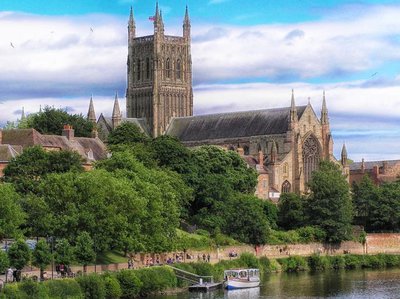Thoughts for the Day
Thursday, 19th January 2023: Saint Wulfstan, the Bishop who fought slavery (1095 CE)
Saint Wulfstan Matthew 24 Slave Parable Jesus Saint
Reading : Verses from Matthew, Chapter 24

* Worcester cathedral where Saint Wulfstan is buried.
Keep awake therefore, for you do not know on what day your Lord is coming. But understand this: if the owner of the house had known in what part of the night the thief was coming, he would have stayed awake and would not have let his house be broken into. Therefore you also must be ready, for the Son of Man is coming at an unexpected hour.
‘Who then is the faithful and wise slave, whom his master has put in charge of his household, to give the other slaves their allowance of food at the proper time? Blessed is that slave whom his master will find at work when he arrives.
(Lectionary, New Revised Standard Version)
Thoughts
Did you think the idea of abolishing slavery started in the 19th or 20th century? If so, I need to disabuse you! Saint Wulfstan whom we remember today, was a pioneering anti-slavery campaigner in the 11th century. Born at Long Itchinton in Warwickshire, he became a monk at Evesham and later at Worcester, before becoming the Bishop of Worcester in 1062. He was the only Saxon Bishop to keep his post when William the Conqueror became king, and he helped to nurture the transition of the country from Saxon to Norman. His Diocese included Coventry, Worcestershire, Herefordshire, Gloucestershire and stretched down to Bristol. (All the earlier records of the parish in Gloucester where I first worked as a Deaconess were found to be in Worcester!).
Wulfstan was a social campaigner. He once invited a host of important people to a banquet, then brought in hundreds of poor people, and insisted that the nobles served them. He also had a daily ritual of washing the feet of poor people, and he campaigned vigorously against the slave trade. At this time when people who owed debts were sold into slavery in Ireland, Wulfstan spent time in Bristol preaching against this, and eventually slaves held captive there were released. Wulfstan died on 19th January 1095 and was buried beside the High Altar in the cathedral he built in Worcester.
Our reading today reminds us to be faithful Christians, and the example of Saint Wulfstan should encourage us at least to think today of those less fortunate than ourselves. (It also reminds me of my priesting in Worcester cathedral in May 1994 and of my first celebration of Holy Communion which happened to be feet away from the place where Wulfstan is buried).
Prayer
Collect for Saint Wulfstan
Lord God,
who raised up Wulfstan to be a bishop
among Your people,
and a leader of Your Church:
help us, after his example,
to live simply,
to work diligently,
and to make Your kingdom known.
Amen.
You might like to look at this site which lists ways to recognise modern-slavery and campaigns to abolish it:
You could also find out more about Saint Wulfstan here: